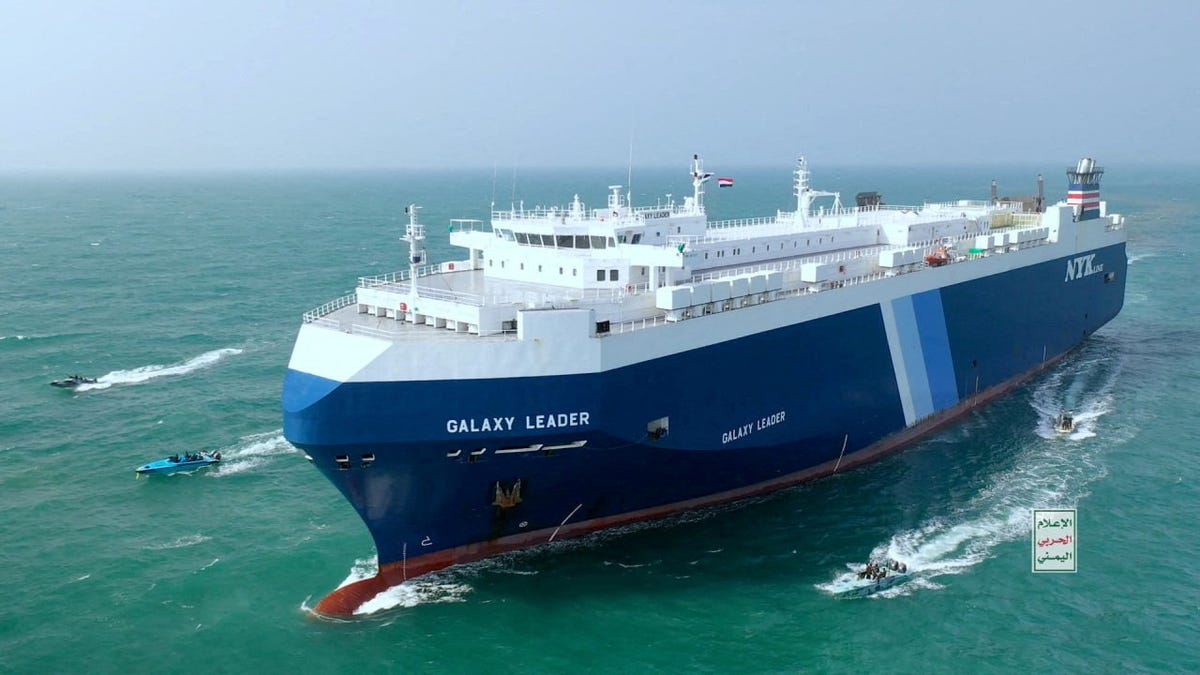
The fallout from the Israel-Hamas war is reverberating in the Red Sea.
The Iran-backed Houthi movement in Yemen has responded to the conflict by escalating attacks on vessels going to or coming from Israel. Reacting to that growing threat—including an attack on one of its ships—the world’s largest container line, Mediterranean Shipping Co. (MSC) decided to stop all voyages through the Suez Canal on Friday (Dec. 15).
“This disruption will impact the sailing schedules by several days of vessels booked for Suez transit,” the Swiss company warned. “We ask for your understanding under these serious circumstances.”
MSC’s alert echoed statements by Danish shipping giant Maersk and Germany’s Hapag-Lloyd the same day. On Dec. 16, CMA CGM also suspended all sailings in the region. The French shipping and logistics company told its container ships scheduled to pass through the Red Sea “to reach safe areas and pause their journey in safe waters with immediate effect until further notice.”
The Houthi attacks, which include firing drones and missiles and holding vessels hostage, began soon after the Oct. 7 Hamas assault and Israel’s relentless retaliation. And they’re showing no signs of slowing down.
“The Houthis will not abandon the Palestinian cause, regardless of any US, Israeli, or Western threats,” Ali al-Qahoum, a member of the Houthis’ Ansarulla politburo, said in an interview with Lebanon-based Al Mayadeen TV late on Dec. 15, Al-Jazeera reported.
A non-exhaustive timeline of Houthi attacks on ships in the Red Sea
Nov. 19: The Galaxy Leader, operated by Japanese shipping company NYK, and its 25-member crew are illegally seized on international waters in the southern Red Sea.
Dec. 14: Maersk reports a near-miss incident after the Maersk Gibraltar is targeted by missile.
Dec. 15: An attack on a Maersk container vessel prompts the company to pause all sailing. A Hapag-Lloyd ship is also attacked. Separately, MSC container ship MSC Palladium III suffers an attack while crossing the Red Sea. “All crew are safe with no reported injuries, meanwhile the vessel suffered limited fire damage and has been taken out of service,” MSC says. Houthi spokesperson Yahya Sare’e claims that another ship, MSC Alanya, was also attacked, but MSC’s statement doesn’t mention it.
If not the Red Sea, where are ships sailing?
The Red Sea has the Suez Canal at its northern end and the narrow Bab el-Mandeb Strait— which leads into the Gulf of Aden—at its southern end, making it a crucial link between Europe and Asia.
Warships from the US, UK, and France are patrolling the area and have even shot down several missiles launched by the Houthis. But commercial players are still unsettled.
“Some companies have already rerouted around the Cape of Good Hope to avoid Houthi aggression which adds cost and delay to global trade,” the International Chamber of Shipping (ICS) said in a Dec. 15 statement. “Industry is extremely concerned about these attacks on shipping and is understood to be considering additional actions which could lead to further ships diverting to this route, with further potential impacts on trade.”
The alternative route, which was also adopted when the Suez Canal was blocked in 2021, has been a hotbed of piracy in the past. And that’s not all: The journey is longer and more treacherous, with fierce winds, rocky outcrops, and heavy shipping traffic.
Shipping in the Red Sea—or not—by the digits
12%: Share of global trade that currently passes through the Red Sea
10+: Ships the Houthis have attacked since Oct. 7
19 to 31 days: How much longer the journey becomes for a vessel circumnavigating from the Red Sea to the Cape of Good Hope, depending on the vessel’s type, speed, and destination, according to Noam Raydan, senior fellow at the Washington Institute for Near East Policy
40%: Share of cargo arriving in Israel that passes through the Suez Canal, as per Elyakim BenHakoun, a maritime transport researcher at the Technion Institute of Technology
$400,0000–$1 million: Cost increase per ship thanks to the longer journey and added delays, according to BenHakoun
Quotable: Yemen will suffer because of Houthi attacks on ships
“Houthi’s interference with navigational rights and freedoms in the waters around the Arabian Peninsula, particularly the Red Sea is unacceptable. The EU reiterates its call on the Houthis to refrain from further threats and attacks to international shipping lanes…Attacks on international vessels undermine Yemen’s security, including food security, as most of the country’s food imports transit through the Red Sea.”
—Peter Stano, lead spokesperson for the European Union’s foreign affairs and security policy
